- Joined
- Nov 26, 2005
- Messages
- 5,223
- Reaction score
- 10,881
Hi Guys,
The Braintree Hill shop is really busy but today I spent some time helping my friend Josh. Some of you may remember our thread "Building Blind". Jim and Katherine Kibler offered Josh a good deal on a Woodsrunner kit so he could see if he could finish it mostly on his own. The answer is, he can but there are a few details for which he needs some help. Rich Pierce and I are providing the guidance and help. Josh came over today and I helped him through some tasks. I only did a few tasks for him, which I will describe, but helped him figure out ways to work independently without sight. He wanted me to help him cut and make make the barrel and pipe pins. The first issue was the slots on the barrel lugs did not permit the 1/16" pin stock to pass through. They were too tight and also had chips of metal from the milling blocking the slot. I had Josh file the slots a little wider and cleaned out the metal chips. He did the task and then we set to fitting the pins. All the pins are 1/16" and the pin holes in the stock are very hard for josh to detect. Josh prefers to remove the barrel for cleaning because of he has better success cleaning barrel by pumping water up and down than just using patches to swab the bore. So we had to figure out a way for this to work. We solved the problem with two fixes. First, we ground the pins a littl short so when tapped in flush with one side of the stock, they are recessed in a shallow hole on the other side. That hole guides Josh's pin punch when tapping out the pin. Secondly, Josh had trouble feeling the small 1/16" holes. So I suggested let's slightly counter sink the holes on both sides of the stock so he could feel the depression and not confuse it with the holes for the ramrod pipes. That worked very well and is barely noticeable.
For practice, I had Josh drill each barrel lug hole keeping the drill level, perpendicular with the stock and let the drill be guided by the existing hole. He did this very well. I had to reacquaint him with techniques we developed for his previous rifle. It as been a long while since he did that work.
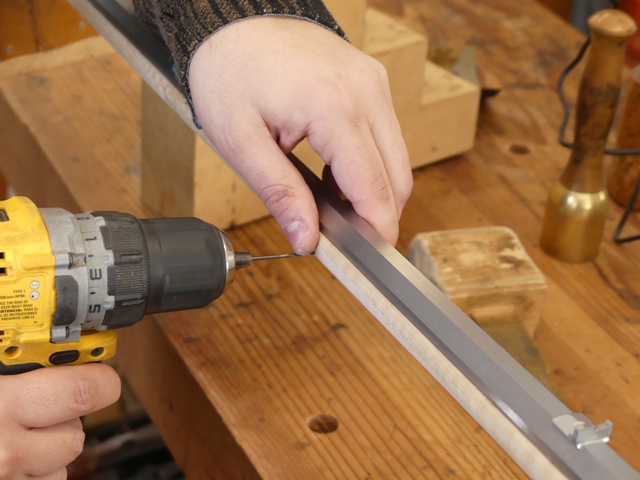
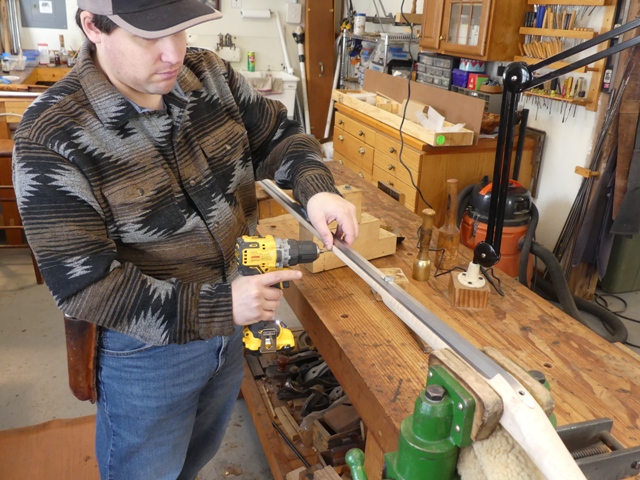
We had to figure a way he could measure the length of the pins. I suggested using tape that he could feel. That worked.
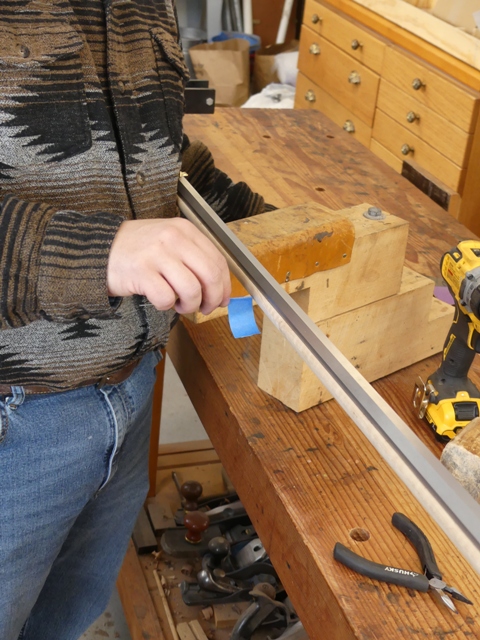
He then used the tape to mark where to cut the pin. Next up for today was to clean up the trigger guard and ramrod pipes, which he did nicely. Without sight it is difficult to file every detail but with a little guidance and the right tools, he did very well. Next was peening over the screws holding on the muzzle cap. He needed to use a ball peen hammer but had trouble consistently hitting the end of the screws. We worked it out such that if he huddled close over the work, he could accurately peen the screws.
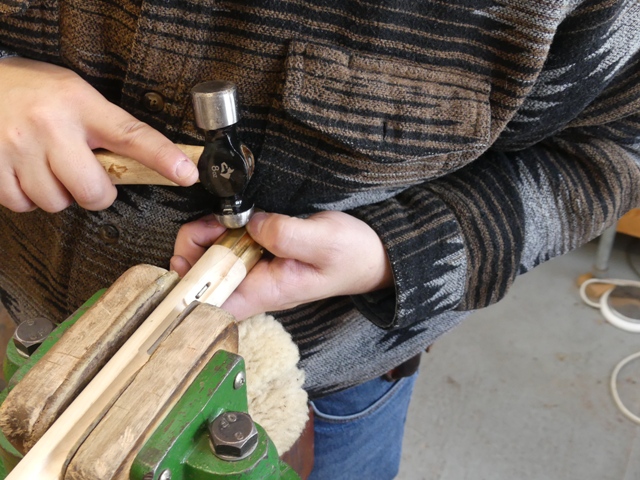
It worked very well. Next up, he wanted to install a back plate on the patch box lid. You see so many Colonial and Woodsrunner assemblers not doing that but Josh, a blind man, wanted to do it. So I set him up to file the end of the lid so the thickness of brass clears the spring catch. He did very well.
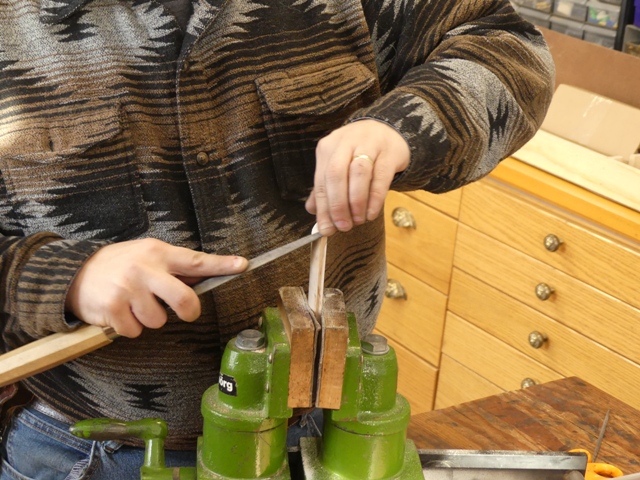
I had to file the dovetails in the brass end and mount the anchoring screws but Josh did all the rest of the fitting and shaping.
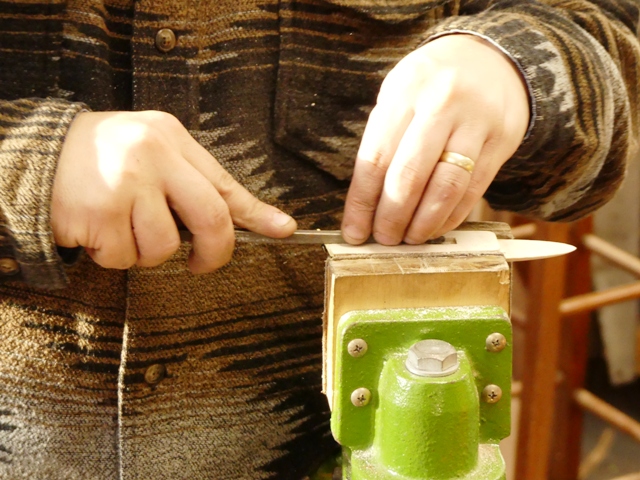
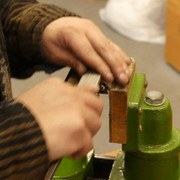
It came out very well.
dave
The Braintree Hill shop is really busy but today I spent some time helping my friend Josh. Some of you may remember our thread "Building Blind". Jim and Katherine Kibler offered Josh a good deal on a Woodsrunner kit so he could see if he could finish it mostly on his own. The answer is, he can but there are a few details for which he needs some help. Rich Pierce and I are providing the guidance and help. Josh came over today and I helped him through some tasks. I only did a few tasks for him, which I will describe, but helped him figure out ways to work independently without sight. He wanted me to help him cut and make make the barrel and pipe pins. The first issue was the slots on the barrel lugs did not permit the 1/16" pin stock to pass through. They were too tight and also had chips of metal from the milling blocking the slot. I had Josh file the slots a little wider and cleaned out the metal chips. He did the task and then we set to fitting the pins. All the pins are 1/16" and the pin holes in the stock are very hard for josh to detect. Josh prefers to remove the barrel for cleaning because of he has better success cleaning barrel by pumping water up and down than just using patches to swab the bore. So we had to figure out a way for this to work. We solved the problem with two fixes. First, we ground the pins a littl short so when tapped in flush with one side of the stock, they are recessed in a shallow hole on the other side. That hole guides Josh's pin punch when tapping out the pin. Secondly, Josh had trouble feeling the small 1/16" holes. So I suggested let's slightly counter sink the holes on both sides of the stock so he could feel the depression and not confuse it with the holes for the ramrod pipes. That worked very well and is barely noticeable.
For practice, I had Josh drill each barrel lug hole keeping the drill level, perpendicular with the stock and let the drill be guided by the existing hole. He did this very well. I had to reacquaint him with techniques we developed for his previous rifle. It as been a long while since he did that work.


We had to figure a way he could measure the length of the pins. I suggested using tape that he could feel. That worked.

He then used the tape to mark where to cut the pin. Next up for today was to clean up the trigger guard and ramrod pipes, which he did nicely. Without sight it is difficult to file every detail but with a little guidance and the right tools, he did very well. Next was peening over the screws holding on the muzzle cap. He needed to use a ball peen hammer but had trouble consistently hitting the end of the screws. We worked it out such that if he huddled close over the work, he could accurately peen the screws.

It worked very well. Next up, he wanted to install a back plate on the patch box lid. You see so many Colonial and Woodsrunner assemblers not doing that but Josh, a blind man, wanted to do it. So I set him up to file the end of the lid so the thickness of brass clears the spring catch. He did very well.

I had to file the dovetails in the brass end and mount the anchoring screws but Josh did all the rest of the fitting and shaping.


It came out very well.
dave





